River Cruises
Transcend Cruises wants to bring a new class to river cruises
Frances Marcellin speaks to Matthew Shollar, Co-founder of Transcend Cruises, about how the operator’s ambitions to take on the B2B market with its new river cruise offering.
Image: copyright
Transcend Cruises is building a fleet of identical river ships dedicated to chartering B2B clients in Europe. The first will launch in March 2024, but a fleet of eight is planned by 2027. Tillberg Design of Sweden has created a prototype that converts from 120 passengers/60 staterooms to 30 two-bath suites, to make the offering as flexible as possible.
Markets targeted are Meetings, Incentives, Conferences and Exhibitions (MICE) – the highest revenue contributor to the tourism industry accounting for $916bn in 2019 and projected to reach $1,439bn in 2025 – as well as alumni gatherings, third-party agencies, and private family groups.
The seed for Transcend Cruises’ concept was planted during Shollar’s earlier career. He has worked in the luxury cruise space and travel business for over 20 years, but in the early 2000s, he was CEO of Chosen Voyage, a company chartering Windstar’s cruise ships for the kosher observant market.
As the word spread, Shollar received requests from private groups for a similar experience and while he could service several, he recalls that around 50 were turned away because he couldn’t find the ships to fulfil the demand. Two decades later he launched Transcend Cruises.
Frances Marcellin: When was Transcend Cruises founded?
Matthew Shollar: Transcend Cruises has been in the operative planning stages for over four years, and in active development for over two. We had been in “stealth mode” until our dual show announcements at Seatrade in April (concept) and at IMEX in May (ship and product). There are about ten of us working on Transcend, and it's an exceptional group of very experienced cruise, hospitality, and business leaders from different parts of the industry.
Who are the shipbuilders?
Our ships are being built by family-owned Den Breejen Shipyard in Holland. They are a highly-skilled and very creative group that has really helped us to expand the boundaries of what is possible from a technical perspective, and also by working with us to innovate in the sustainable operations realm.
The ships are yacht-inspired, how they are different to the standard design of river ship?
While all river ships are, to some extent, similar – they have the same dimensions and many consistent design similarities in existing fleets – we have taken several approaches to a new level of design in our vessels.
Our ships are very contemporary and uncluttered, yet have a strong emphasis on comfort – a purpose-driven design process that has created spaces both residential in feel, yet exceptionally adaptable for our clients’ needs. Biophilic principles and circular-sourced materials are also part of our DNA.
What has Tillberg Design of Sweden brought to the design?
I can't say enough about Tillberg. When we were introduced to them several years ago, we felt an immediate bond – they had never designed a river vessel before, and we were looking for more than just a pretty design.
I think the challenges posed by designing to the very defined specs that are unique to European river cruising have created a space for us to really test the whiteboard and get away from the conventions that have driven the industry. Peter Snellman, who is leading the design team at Tillberg, doesn't seem to have the word “no” in his vocabulary and that has led to a truly standout result.
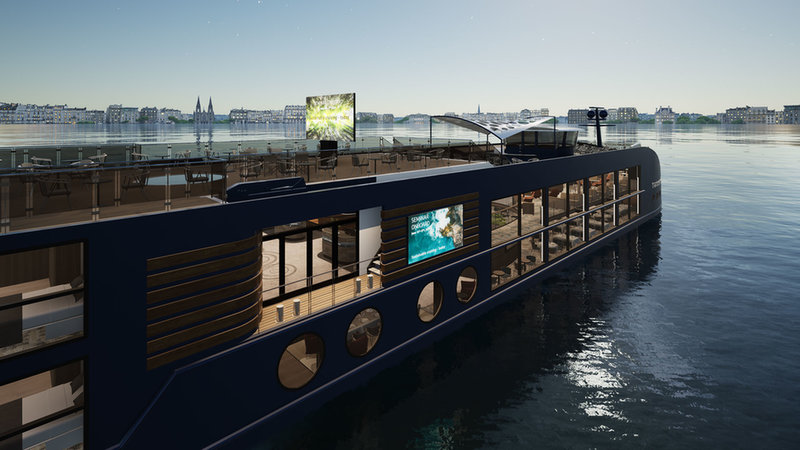


Transcend’s river vessels are designed by Tillberg Design of Sweden. Credit: Transcend Cruises
Your company is B2B; what kind of groups are you designing your ships for and why?
Our client is the group looking for a dedicated venue for their own programmes. We serve multiple vertical markets. Some are traditional users of river cruising, like tour operators and college alumni/cultural affinity programmes; while others are new entrants like family buyouts, sponsored media travel, and wellness programs.
The biggest single market opportunity is the MICE/corporate vertical. Existing ships have been used in the past, but there is a real challenge for groups that need like accommodation that is not the standard in the industry today.
There is a strong group programming dynamic that runs through in a common thread, which is what we refer to as "front-led programming" – the speaker-driven or topic-focused nature of these groups’ interests and their basis for participation.
This might include lectures, hybrid corporate meetings, trunk shows, arts demonstrations, or book signings. The needs of these clients are not aligned with the current options in the market, such as river cruises, ocean cruises, and in some cases land-based hotels and resorts.
What are the differences in designing for groups compared with the standard river cruise ship offering?
The fleets of the existing operators are optimised for their core clientele – namely, boomers and couples. The ships are very good and the related programming, like food and beverage services and entertainment, are well regarded.
But the product is inherently mismatched to the needs of the upscale group operators that we are bringing to the market. So much so, that river cruising has generally been not a focus for our audience. There is little space on board to try to execute programming as detailed above, and varying cabin types pose a challenge for groups that need consistent guest experiences.
What did you feel was missing from standard river ships?
As I and my colleagues executed and sought ships for programmes in the past, we encountered the challenges of attempting to execute a group-focused private programme on a ship built for retail sailings with host lines that were doing 90% of their business in the retail markets. That lack of specific focus, hardware and software mismatch, and overall pain point level, was the opportunity for Transcend to create a new dynamic in the physical attributes of our ships and services.
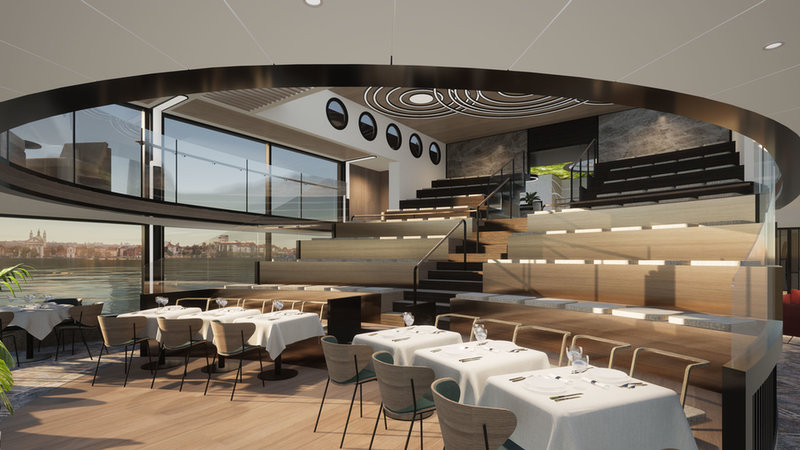
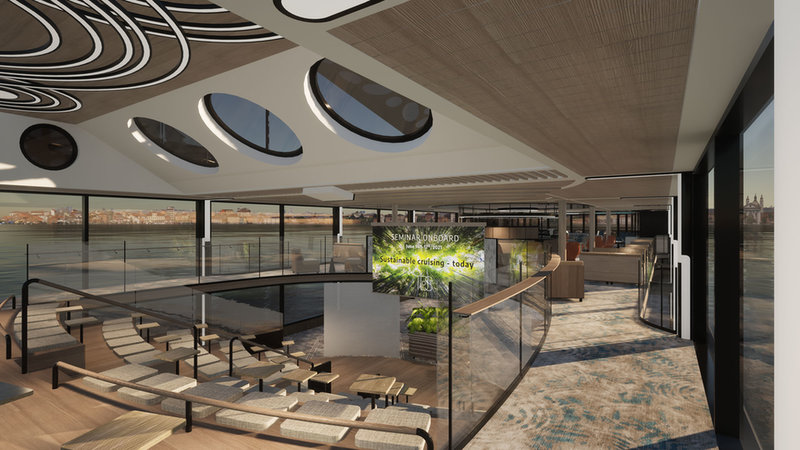
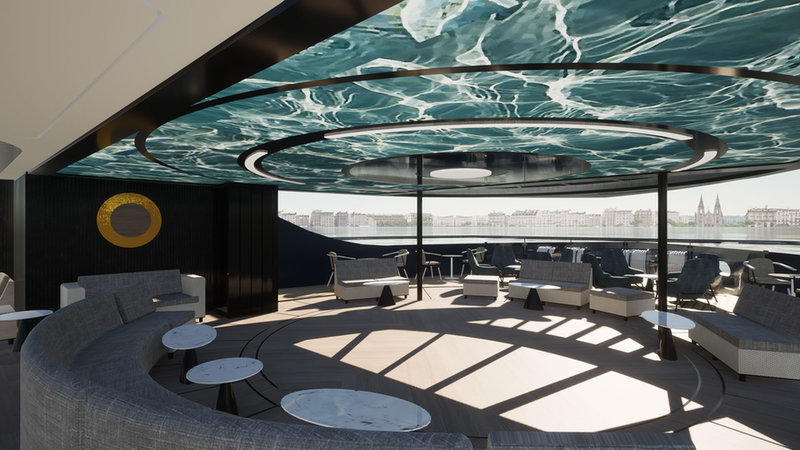

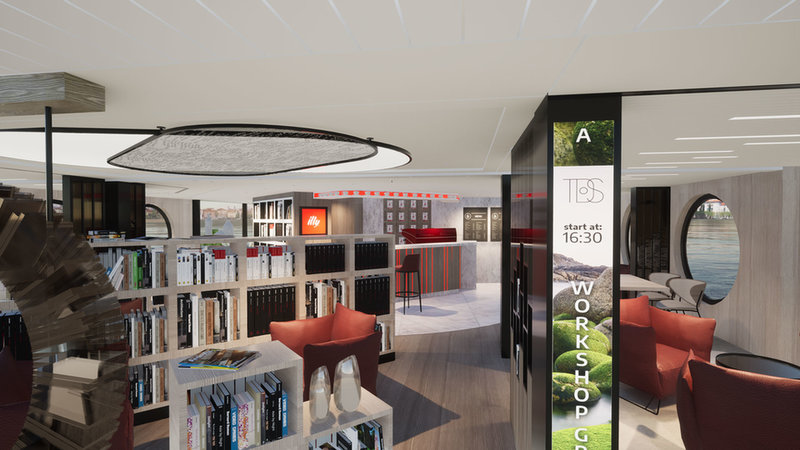
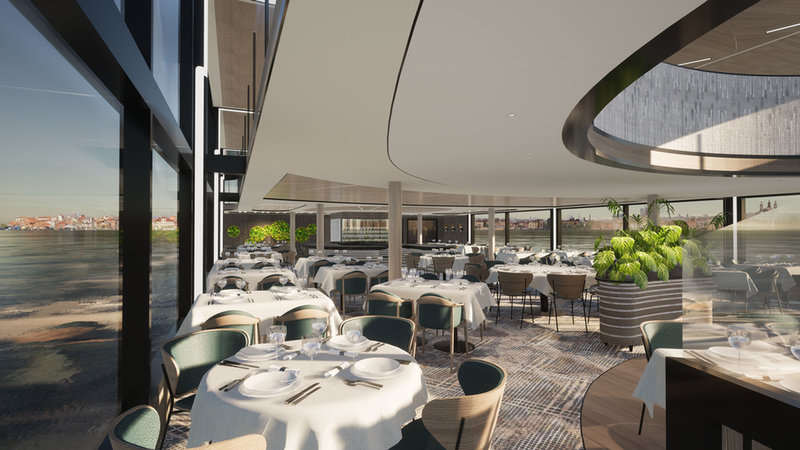
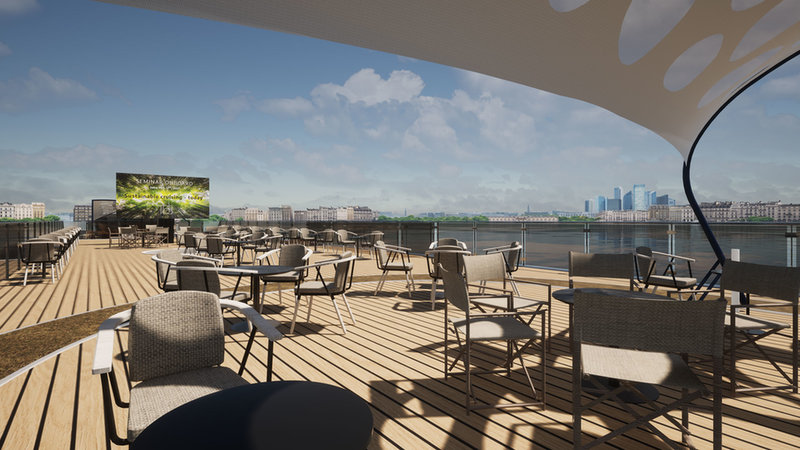
Onboard meeting rooms, lounges, and libraries have all been designed to cater for the MICE market. Credit: Transcend Cruises
Which cruise trends support your decision to design cruise ships for the MICE market and other groups?
There are a number of trends that track closely to our approach. Post-Covid-19 travel sensibilities dictate smaller groups, with readily accessible healthcare on demand and exclusive use of venues. Wellness- and sustainably-focused travel, with an eye toward avoiding over-touristed and congested, are very much at top of mind. On top, companies are looking to create unique programs and gain customisation and adaptation abilities that don’t exist today.
How can you avoid the over touristed and congested areas?
I kind of equate it to being in the Caribbean. If you come into St. Martin on a Wednesday, there are 15 ships in port and an island where 10,000 people live, and 15,000 tourists have just gotten off the ship. If you come the next day, there's no one there because it's off cycle. The same thing has happened on the rivers – inevitably they wind up at the same place at the same time and that's why you get these multiple docking situations where you have to walk through four other ships to get to shore.
We don't have an itinerary. We don’t have a deployment schedule. Instead, what we have is an opportunity for clients to book what they need – although we do operate a three-day minimum charter sailing – and we can keep away from the rigid itineraries that everyone else is doing. Many of our clients are looking to do things that can be delivered in other locations.
How does this flexibility support your product offering?
It’s really customised. We can start in the other direction by saying: what do you need to deliver to your clients and where can we travel to, to give them their bucket list experience? We're really reversing the polarity of the relationship with the client – and therefore we can bring people to some of these wonderful, smaller places. Of course, if a client wants a more traditional product, we'll deliver that. But we offer them opportunities they wouldn't have otherwise.
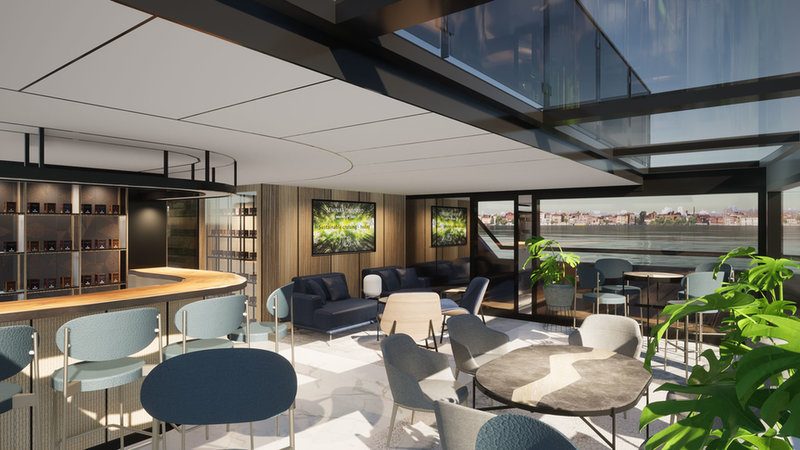
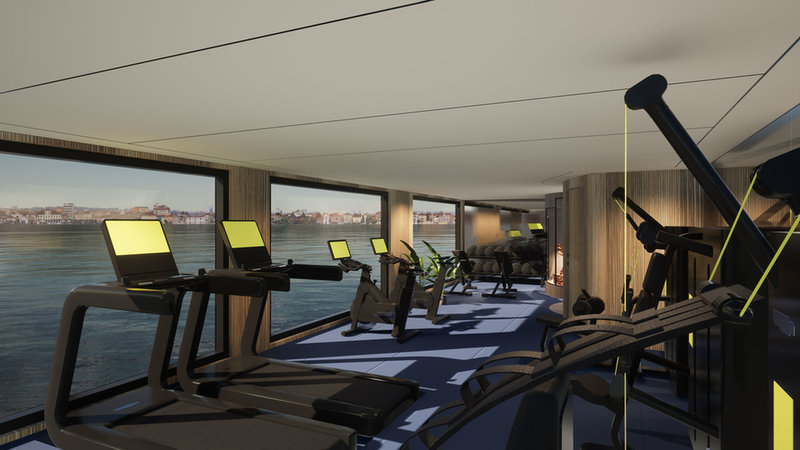
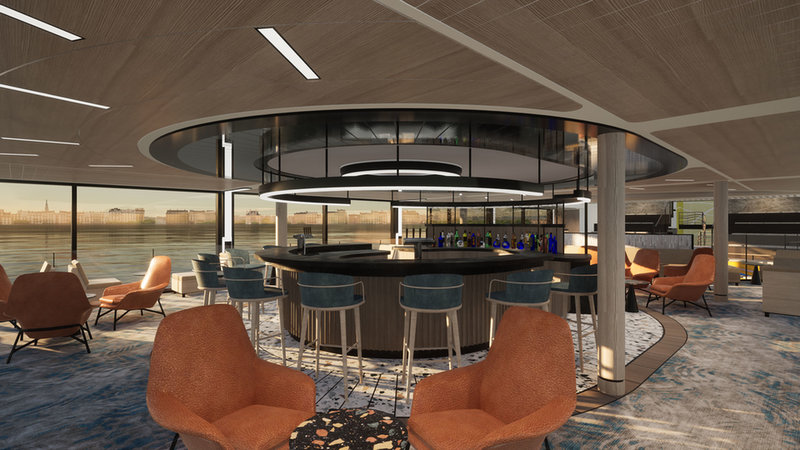
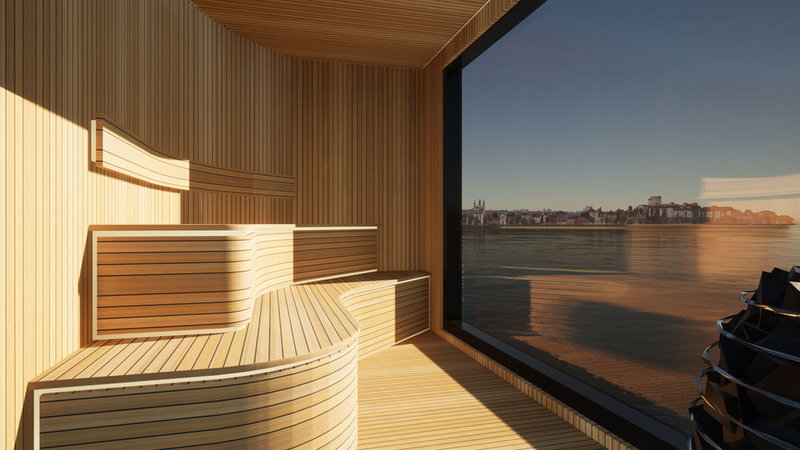
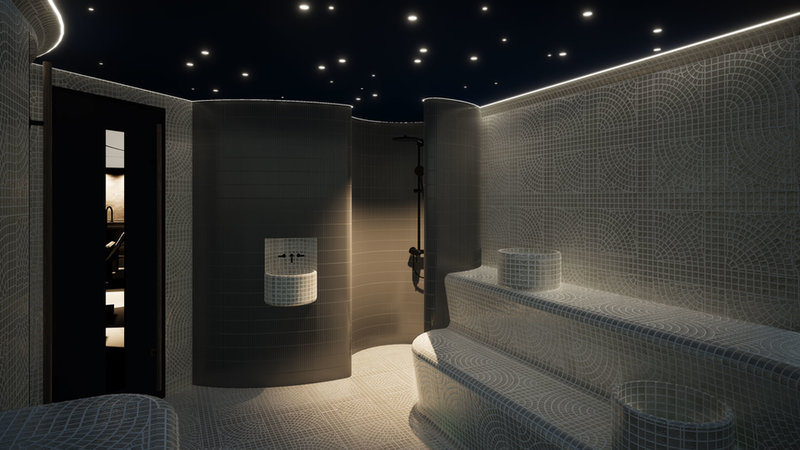
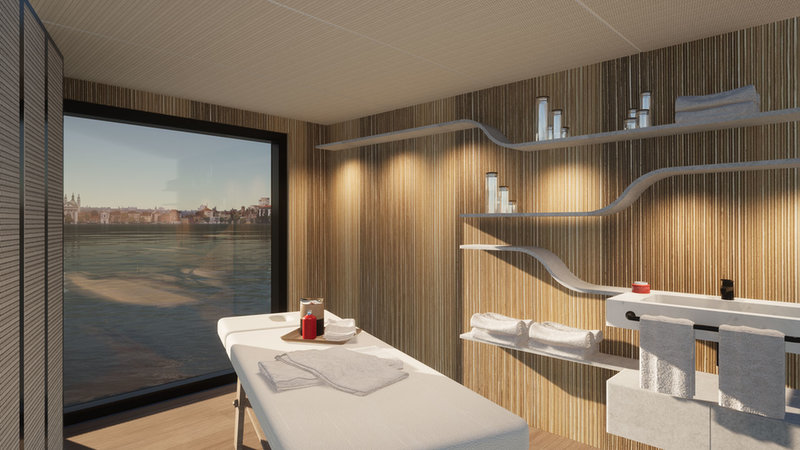

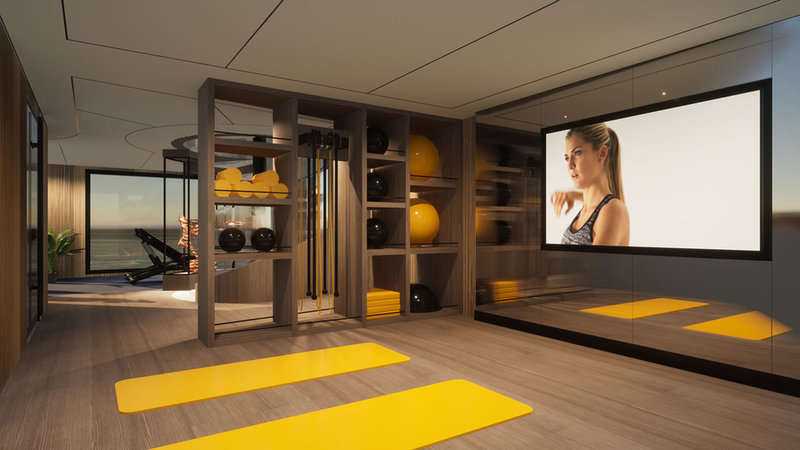
There are a host of health & wellness options onboard, as well as lounges and bars for relaxation. Credit: Transcend Cruises
The ships are cleverly designed to convert from 120 passengers/60 staterooms to 30 two-bath suites, why is that?
Flexibility and adaptation are our promise, and those elements flow through every area of our ships – from guest staterooms to public spaces, from charterer support to digital onboard branding, and from custom food and beverages to designing your own itinerary. Everything about Transcend is about this offer of a truly bespoke program.
There is a very extensive wellness zone that stretches over three decks, offering elements not usually found on river vessels, including a true spa, with wet areas, treatment rooms, a river-facing sauna, a ten-station gym and a digital yoga studio. In fact, our ships offer more square feet of wellness space per guest than many luxury ocean vessels.
We have five areas where all guests can gather for programming, with the highlight being the two-deck Forum presentation studio. We have up to five locations for formal dining, and up to ten for pop-up F&B. On the lower level, we have replaced the usual entry-level cabins with The Workshop, a 1,500 square-foot centre that can be customised to the charterer's needs, which can include activity space for kids.
We are also building a number of charterer support elements, including several double occupancy cabins for support staff, a fully-equipped office, and dedicated storage.
What sustainability practices have you built into your business?
We have lower emission engines, replaced diesel generators with battery packs in several areas, and have re-engineered liquid storage to reduce fuel burn and also cut our draft by about 10cm. We have prioritised circular building materials where possible, and have a managed hotel operations strategy to mitigate issues everywhere from food waste to supplier support.
Have you already had charter requests?
We are very fortunate to have significant presales at this point. The response from our charter partners has been phenomenal. We are coming from having been in their shoes and are absolutely committed to erasing their pain points in chartering.
Main image: Matthew Shollar, Co- founder of Transcend Cruises